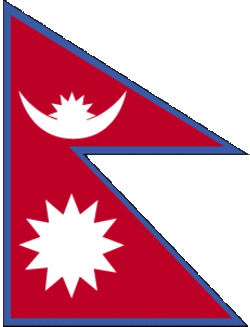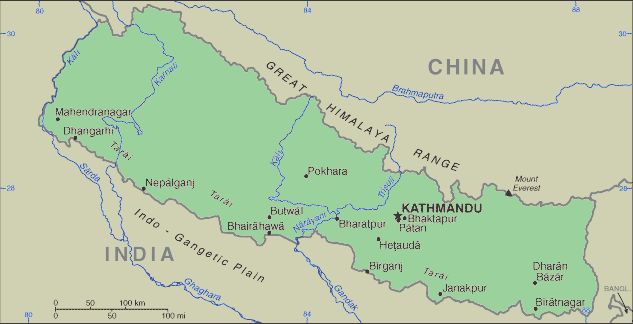Traveling Luck for Nepal. Nepal, Asia
Nepal is located in Southern Asia, between China and India.
Land in Nepal is Tarai or flat river plain of the Ganges in south, central hill region, rugged Himalayas in north.
Nepalese land covers an area of 147181 square kilometers which is slightly larger than Arkansas
Nepal has borders with China for 1236km and India for 1690km.
 Nepalese national flag (Flag of Nepal)
Nepalese national flag (Flag of Nepal)
As for the Nepalese climate; varies from cool summers and severe winters in north to subtropical summers and mild winters in south.
Nepalese (singular and plural) speak Nepali 47.8%, Maithali 12.1%, Bhojpuri 7.4%, Tharu (Dagaura/Rana) 5.8%, Tamang 5.1%, Newar 3.6%, Magar 3.3%, Awadhi 2.4%, other 10%, unspecified 2.5% (2001 census)
note: many in government and business also speak English.
Places of note in Nepal
- Kathmandu
- Pātan
- Birātnagar
- Bīrganj
- Dharān Bāzār
- Bharatpur
- Janakpur
- Dhangarhi
- Butwāl
- Mahendranagar
- Heṭauḍā
- Bhaktapur
- Bhairāhawā
- Gulariyā
- Ithari
- Tīkāpur
- Kirtipur
- Tulsīpur
- Rājbirāj
- Lahān
- Panaoti
- Gaur
- Sirāhā
- Jaleswar
- Bāglung
- Khāndbāri
- Dhankutā
- Wāling
- Dailekh
- Malangwa
- Bhadrapur
- Dadeldhurā
- Dārchulā
- Ilām
- Banepa
 Nepalese map
Nepalese map
Regions of Nepal
In 1951, the Nepalese monarch ended the century-old system of rule by hereditary premiers and instituted a cabinet system of government. Reforms in 1990 established a multiparty democracy within the framework of a constitutional monarchy. A Maoist insurgency, launched in 1996, has gained traction and is threatening to bring down the regime, especially after a negotiated cease-fire between the Maoists and government forces broke down in August 2003. In 2001, the crown prince massacred ten members of the royal family, including the king and queen, and then took his own life. In October 2002, the new king dismissed the prime minister and his cabinet for "incompetence" after they dissolved the parliament and were subsequently unable to hold elections because of the ongoing insurgency. While stopping short of reestablishing parliament, the king in June 2004 reinstated the most recently elected prime minister who formed a four-party coalition government. Citing dissatisfaction with the government's lack of progress in addressing the Maoist insurgency and corruption, the king in February 2005 dissolved the government, declared a state of emergency, imprisoned party leaders, and assumed power. The king's government subsequently released party leaders and officially ended the state of emergency in May 2005, but the monarch retained absolute power until April 2006. After nearly three months of mass protests organized by the seven-party opposition and the Maoists, the king allowed parliament to reconvene on 28 April 2006.
Nepal is among the poorest and least developed countries in the world with almost one-third of its population living below the poverty line. Agriculture is the mainstay of the economy, providing a livelihood for three-fourths of the population and accounting for 38% of GDP. Industrial activity mainly involves the processing of agricultural produce including jute, sugarcane, tobacco, and grain. Security concerns relating to the Maoist conflict have led to a decrease in tourism, a key source of foreign exchange. Nepal has considerable scope for exploiting its potential in hydropower and tourism, areas of recent foreign investment interest. Prospects for foreign trade or investment in other sectors will remain poor, however, because of the small size of the economy, its technological backwardness, its remoteness, its landlocked geographic location, its civil strife, and its susceptibility to natural disaster.
Nepalese natural resources include quartz, water, timber, hydropower, scenic beauty, small deposits of lignite, copper, cobalt, iron ore
landlocked; strategic location between China and India; contains eight of world's 10 highest peaks, including Mount Everest and Kanchenjunga - the world's tallest and third tallest - on the borders with China and India respectively
Nepalese religion is Hindu 80.6%, Buddhist 10.7%, Muslim 4.2%, Kirant 3.6%, other 0.9% (2001 census).
Natural hazards in Nepal include severe thunderstorms, flooding, landslides, drought, and famine depending on the timing, intensity, and duration of the summer monsoons.
Travel Advice for Nepal
NepalSUMMARY
- The Government of Nepal and the Maoists signed a peace agreement on 21 November 2006, thereby officially ending eleven years of conflict in the country. Both sides have agreed to a UN monitored permanent ceasefire. The security situation in Kathmandu and elsewhere in Nepal has improved. However, it is too early to say how the peace agreement will affect the security situation in the country. See Safety and Security section of this travel advice for more details.
- Throughout January 2007 there was civil unrest and violence in the Terai district. Riots and roadblocks in the Terai are preventing supplies reaching the rest of the country and disrupted transport. In Kathmandu, petrol is being rationed. Fewer taxis and buses are operating. If the riots continue, internal flights may be cancelled. You should check with the airline before flying. See the Political Section of this travel advice for more details.
- You should be aware that demonstrations and strikes can be called at short notice and some demonstrations have suddenly turned violent. You are therefore strongly advised to avoid all demonstrations and large gatherings and remain vigilant at all times. See the Political Situation section of this travel advice for more details.
- You should be aware of the global risk of indiscriminate terrorist attacks, which could take place in public areas, including those frequented by foreigners.
- During 2006, a number of bombings, shootings and armed clashes took place across Nepal. See Safety and Security section of this travel advice for more details.
- The main types of incident for which British nationals require consular assistance in Nepal are generally as a result of either trekking accidents or drug-related incidents. You are strongly advised to use a reputable travel agent and only trek with an experienced guide and in a group. If you plan to travel to remote areas, please contact the British Embassy in Kathmandu on arrival for latest advice on the security situation in the area.
- We also strongly recommend that you obtain comprehensive travel and medical insurance before travelling. You should check for any exclusions, and that your policy covers you for all the activities you plan to undertake. Please see Travel Insurance page of the FCO website.
SAFETY AND SECURITY
Incidences of Maoist extortion of money from trekkers and climbers continue to occur on all main trekking routes. There are reports that tourists have faced demands for "taxes" upwards of 5000 Nepalese rupees. Although there is no evidence that violence has been used during these incidents, this could not be ruled out if trekkers were to decline to pay. It is too early to say whether the signing of the peace agreement will lead to any reduction in these incidents.
Political Situation
A peace agreement between the Government of Nepal and the Maoists was signed in Kathmandu on 21 November 2006 thereby ending 11 years of conflict in Nepal. Under the terms of the agreement the Nepali Army and Maoist cadres will be confined to barracks and cantonments. Both sides have agreed a permanent ceasefire and an arms management arrangement, which will be monitored by the UN. The agreement also provides that the Maoists will eventually become part of the political mainstream as a legitimate political party. A Constituent Assembly will decide on the role of the Monarchy.
Transport usually operates freely in the Kathmandu valley, except during times of major demonstrations. Traffic in Kathmandu normally flows reasonably well though there are sometimes major jams during rush-hour in the city. Access to the valley from the Pokhara direction has improved with the widening of the road at the major checkpoint entering Kathmandu.
Traffic in Nepal drives on the left, as in the UK. The general standard of driving throughout the country is poor and badly regulated. Roads in Kathmandu are very congested. Many drivers are not properly licensed, trained or insured and vehicles are poorly maintained. There are few pavements outside central Kathmandu and motorists do not yield right of way to pedestrians.
Bus travel is particularly hazardous and multiple-fatality accidents are common. You should avoid travel on overnight buses.
Road conditions are generally poor and difficult even in the best of conditions. During the monsoon season (June to September) many roads outside the Kathmandu valley are prone to landslides and become impassable.
You must have an international driving licence to drive a vehicle in Nepal. You are strongly advised to carry your licence with you at all times when driving as well as any documents relating to the vehicle itself.
LOCAL LAWS AND CUSTOMS
You should respect local customs. Women should avoid wearing shorts and sleeveless tops in public places where this might be seen as inappropriate.
ENTRY REQUIREMENTS
Entry to Nepal may be refused, and airlines may not carry you if your passport has less than six months validity. Overstaying without authority is serious and you can be detained or refused permission to leave until a fine is paid. For further information you should check with the Nepalese Embassy, 12A, Kensington Palace Gardens, London, W8 4QU (Tel: +20 7229 1594 or 6231 or 5352); (Fax: +20 7792 9861) Website: http://www.nepembassy.org.uk/
HEALTH
In December 2005, nearly 3000 cases of Japanese encephalitis were reported of which more than 300 people died. The most affected areas were in the western, mid-western and far-western regions of Nepal. For further details of areas affected please see the World Health Organisation Regional Office for South East Asia website at: Japanese Encephalitis.
You should seek medical advice before travelling and ensure that all appropriate vaccinations are up to date. For further information on health, check the Department of Health’s website at www.dh.gov.uk.
GENERAL
- Register with the Embassy on arrival.
- Carry your passport with you at all times.
- Leave a photocopy of your passport and your itinerary with a contact in the UK.
- Enter next of kin details into the back of your passport.
- Do not enter 'Restricted' areas. Strict terms and conditions apply. Check with a reputable trekking company.
- Remember: altitude can and does kill. To avoid acute mountain sickness ascend slowly and acclimatise fully. Take professional advice.
- Reconfirm your flights (both internal and international) before departure as they are often cancelled with very little advance warning, particularly during adverse weather conditions.

 Search
Search Nepal country profile
Nepal country profile Travel advice for Nepal
Travel advice for Nepal